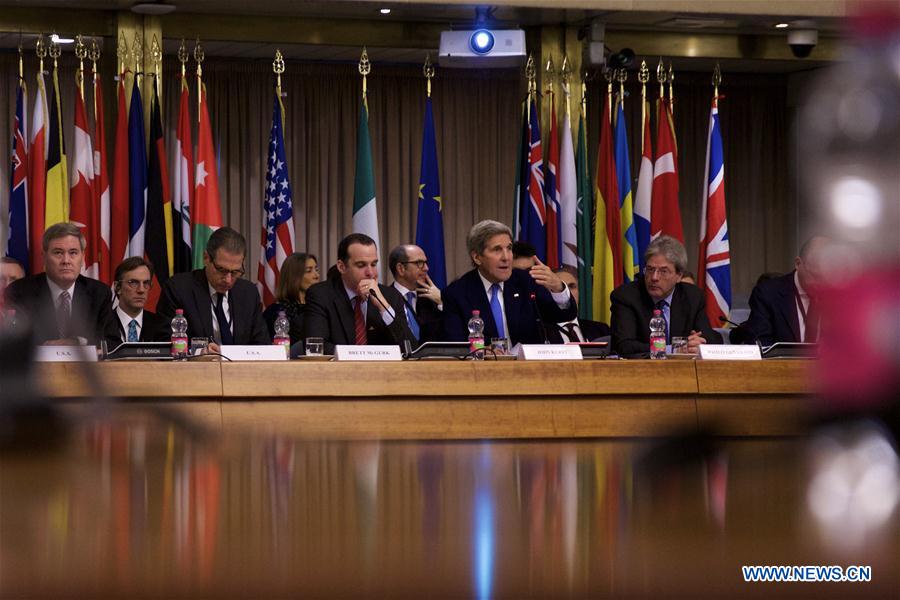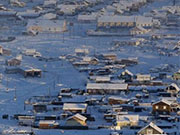


Photo taken on Feb. 2, 2016 shows the ministerial meeting regarding the action against Islamic State group in Rome, Italy, Feb. 2, 2016. Key members of the global coalition against so-called Islamic State (IS), or Daesh, gathered in a meeting here on Tuesday, and pledged to step up military action against the group in Iraq and Syria.(Xinhua/Jin Yu)
ROME, Feb. 2 -- Key members of the global coalition against so-called Islamic State (IS), or Daesh, gathered in a meeting here on Tuesday, and pledged to step up military action against the group in Iraq and Syria.
Yet, they did not announce any immediate similar action in Libya to prevent IS militants to make further progress on the ground.
The 23-country ministerial conference was co-chaired by Italy's Minister of Foreign Affairs Paolo Gentiloni and the U.S. Secretary of State John Kerry.
"Relevant progresses have been made against Daesh, but the organization we face is very resilient and able to plan strategically, and we should not underestimate it," Gentiloni said.
"The Daesh has lost 40 percent of the territory under its control in Iraq, and 20 percent in Syria in recent months ... thanks to the joint commitment and resolve of all of us," he added at a press conference after the meeting.
Steps forwards were also being made in terms of cutting IS's access to financial resources.
The 23 ministers said in a final statement that they will"intensify and accelerate the campaign against Daesh in Iraq and Syria", expressing their determination to counter and push back Daesh's global ambitions.
Yet, the ministers did not mention any direct military action in the North African country of Libya in the immediate future.
"We follow with concern the growing influence of IS/Daesh in Libya, and will continue to monitor closely developments there", the final statement said.
"We will stand ready to support the Government of National Accord in its efforts to establish peace and security for the Libyan people," it added.
"In Libya, we are on the brink of getting a government of national unity, and that will prevent Daesh from turning it into a stranglehold on the country's future," Kerry said.
Libya has big resources, and the last thing the world needs would be "a false caliphate with access to billions of dollars of oil revenue", according to the U.S. secretary.
"This means we need to push full speed ahead with training security personnel and we need to ensure there is a decisive military edge not just to clear territory but to create a safe environment for a government to begin to stand up and operate," Kerry added.
Italy's Foreign Minister also acknowledged there were "renewed activities" by IS in Libya and in Sub-Saharan African countries, and he stressed that "the coalition should improve its coordination".
Italy has repeatedly said it would be ready to take part, and even a leading role, in a military mission against IS in Libya, but only if strictly authorized by the United Nations (UN) and under request of a stable Libyan government.
Gentiloni reiterated the stance on Tuesday, saying "it is very comforting for us to see there was a great convergence here (among coalition's members) on the need to consolidate the negotiating process in Libya," Gentiloni said.
"Italy is ready to answer to a request from a new government in Libya on several issues, including security".
"Yet, the key point is that we need a political process going on, and a unity government with the full endorsement of the Libyan parties in the next two weeks. This is possible, and is what we are all working for," Gentiloni stressed.
Since early 2015, the increasing presence of IS in Libya has been a factor of major concern for the international community, and for Italy, whose most southern coasts lie only few hundreds kilometers from the North African country.
Libya has been engulfed in fighting between rival factions since former leader Muammar Gaddafi was toppled in 2011 after a NATO-backed military intervention, and two administrations have contended for the power since 2014.
A UN-brokered deal to form a national unity government was reached in December, but failed so far to gain approval from the two rival parliaments.
Day|Week

 'Coldest town in China' — a fairyland you don't want to miss
'Coldest town in China' — a fairyland you don't want to miss Deep love for breathtaking Hainan
Deep love for breathtaking Hainan Beautiful Chinese tennis player Wang Qiang goes viral online
Beautiful Chinese tennis player Wang Qiang goes viral online Minus 71 degrees! Coldest village on earth
Minus 71 degrees! Coldest village on earth Chinese pole dancing master opens class in Tianjin
Chinese pole dancing master opens class in Tianjin The most beautiful town of snow in China
The most beautiful town of snow in China SWAT members hold romantic wedding in E China
SWAT members hold romantic wedding in E China Breathtaking scenery and simple lifestyle in Hainan
Breathtaking scenery and simple lifestyle in Hainan Finding sexiest underwear supermodels
Finding sexiest underwear supermodels Top 10 ancient pagodas in China
Top 10 ancient pagodas in China